|
The Street
Eastling
01795 890234
https://www.carpenterseastling.co.uk/
https://whatpub.com/carpenters-arms
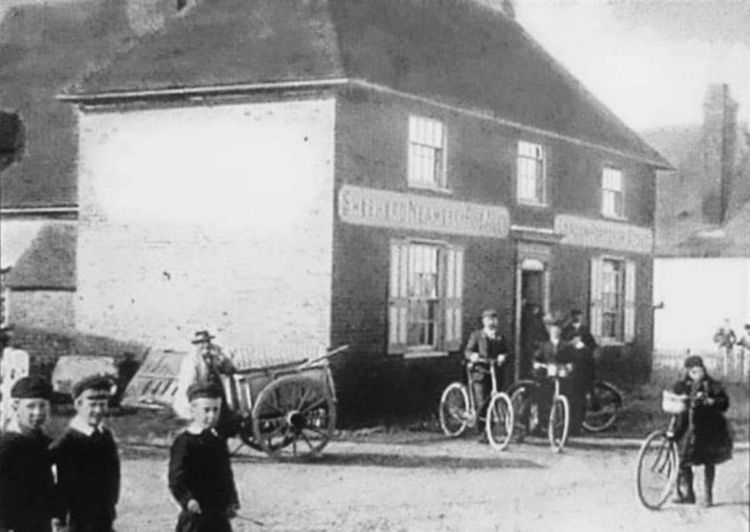
Above photo, date unknown. |
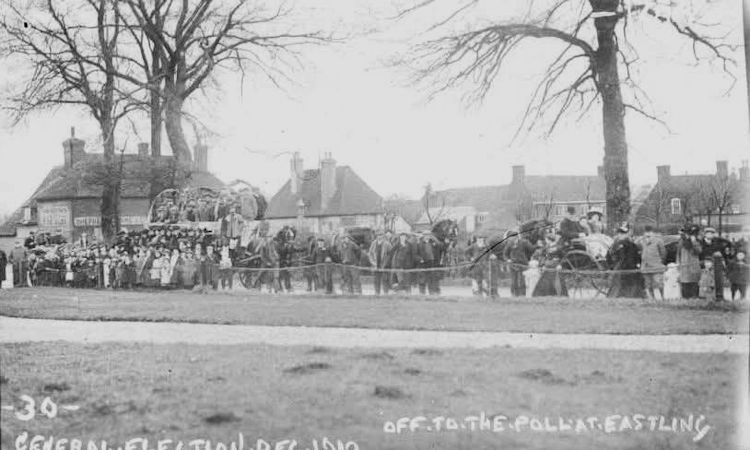
Above postcard, circa 1910. |
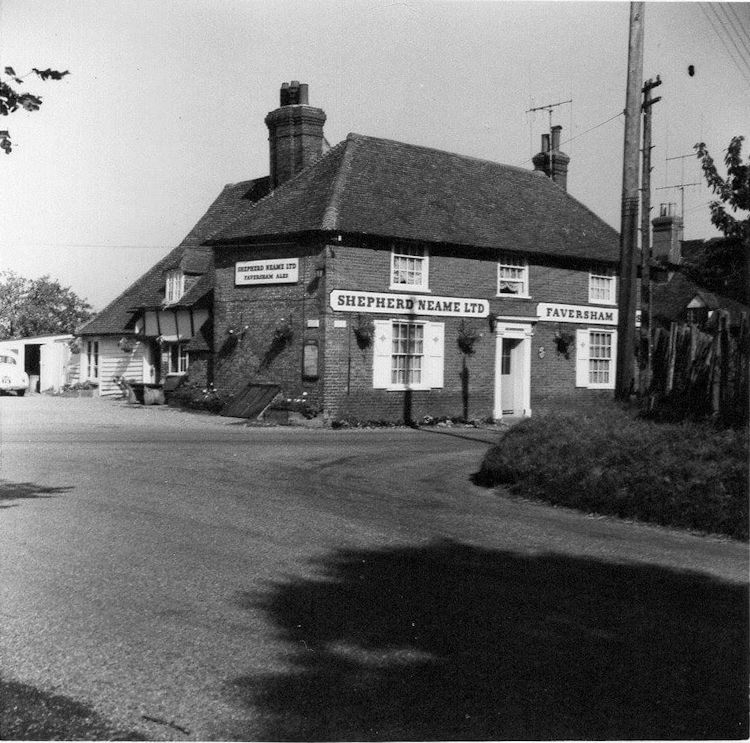
Above photo, date unknown. |
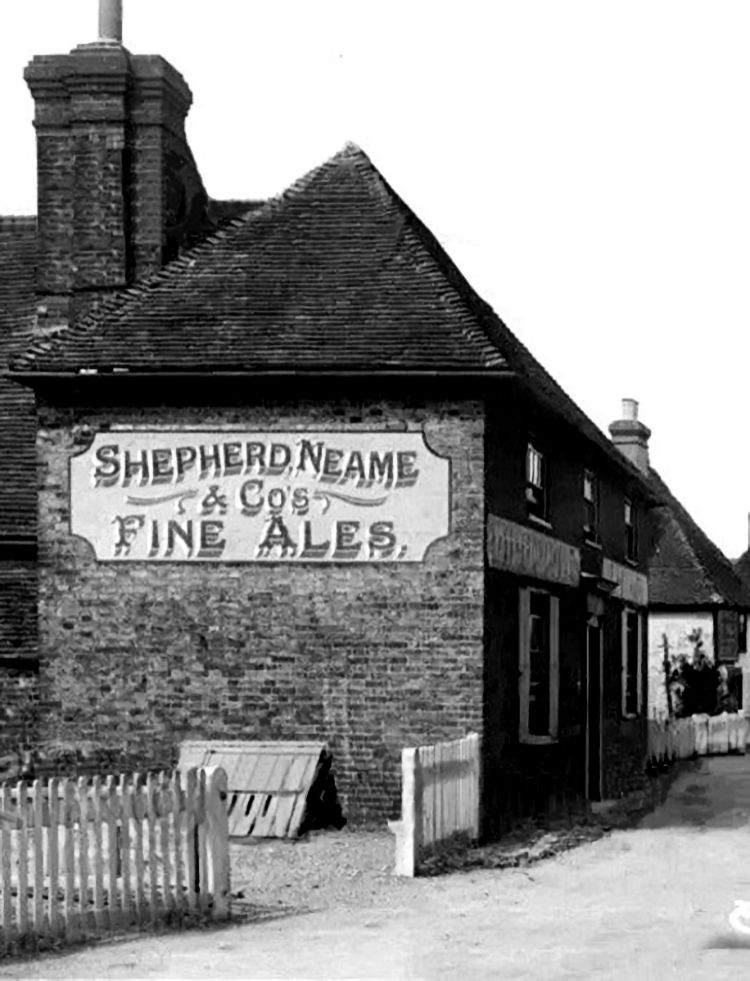
Above photo, circa 1913, kindly sent by Rory Kehoe. Showing the pub,
then as now, as a tied house, within the estate of Shepherd Neame's
Faversham Brewery. |
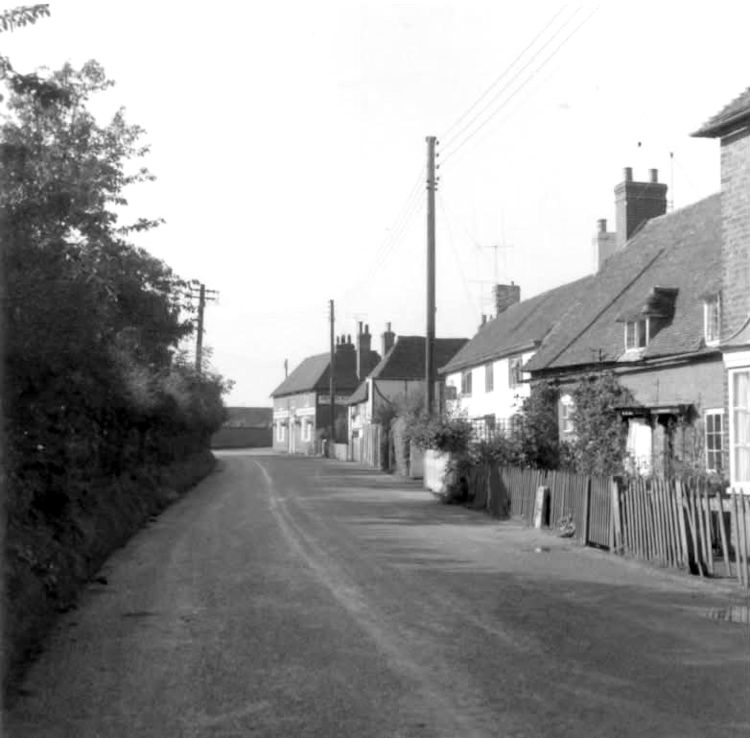
Above photo, 1968. |
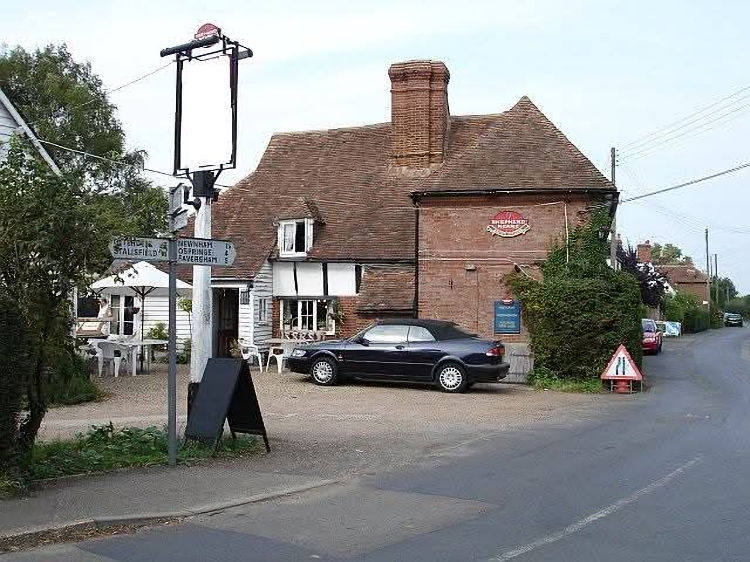
Above photo, date unknown. |

Above photo 2010 by David Anstiss
Creative Commons Licence. |

Above photo, circa 2023. |
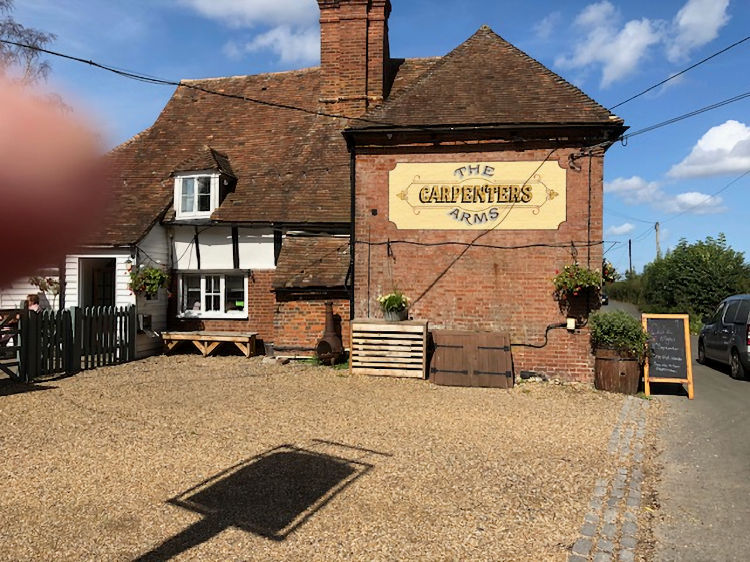
Above photo, 2024. Kindly sent by Michael Harris. |
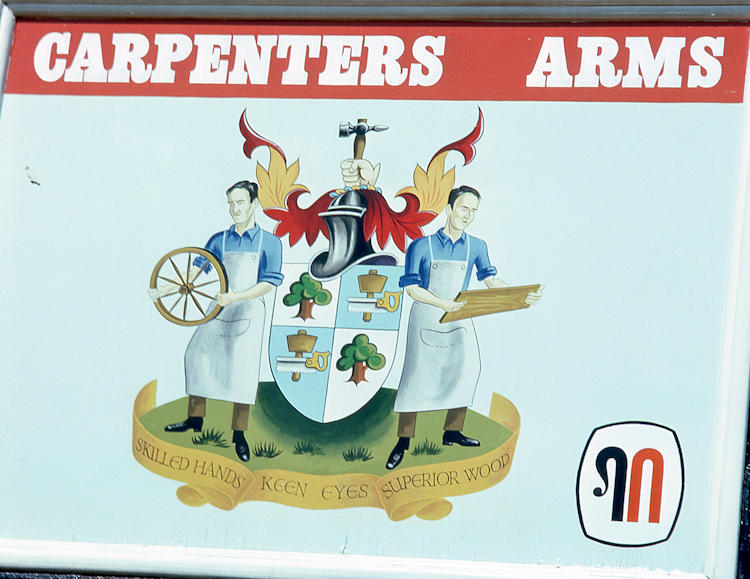
Above sign 1976.
With thanks from Roger Pester
www.innsignsociety.com. |
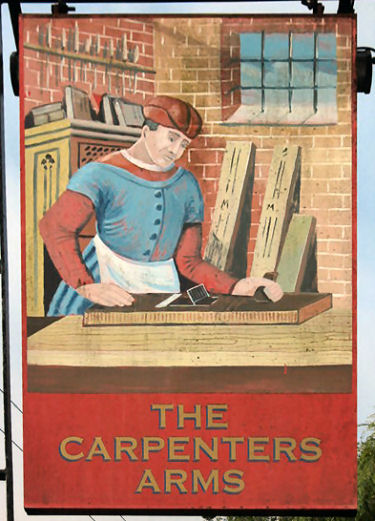 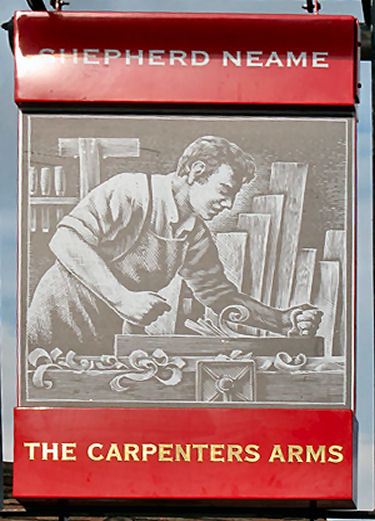
Above sign left 2010. Sign right 2011. |

Above sign painted by sign-writer Eric Pollard. |
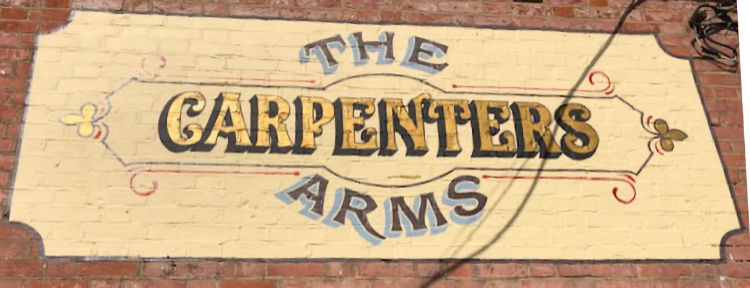
Above sign 2024. Kindly sent by Michael Harris. |

Above photo, 2024 showing the toilets. Kindly supplied by Rory Kehoe who
goes on to say the following:- It appears that Carlsberg and Heineken
have set up a production unit at the "Carpenter's Arms," Eastling, in
order to make their recently watered-down 3.4% lager! Needless to say,
neither of these companies are passing on a penny of the millions of
pounds they'll save, in reduced beer duty payments, to hard-pressed
pubs, or their customers.
I wonder of the ladies have a similar set
up? Paul Skelton. |
The pub is situated opposite to the junction of Kettle Hill Road.
|
26 March 1789.
Insured:- Julius Shepherd, Faversham, Kent, brewer.
Other property or occupiers: Eastling The Carpenter Arms (Ann Bates
victualler).
|
|
26 March 1793.
Insured: Julius Shepherd, Faversham, Kent, brewer.
Other property or occupiers: The White Horse (Elizabeth Field victualler).
|
|
From the Kentish Chronicle, Saturday, 17 September, 1859. Price 1½d.
TEMPORARY INSANITY – PECUNIARY DIFFICULTIES
During the past week, C. J. Fox, Esq., deputy coroner held at the
“Carpenter's Arms” an inquest on the body of William Terry, a shoemaker,
who was found hanging the previous day. James Benstead deposed that he
was called to the deceased house about 10 o'clock on Wednesday morning.
All the doors were fastened, but he effected an entrance through the
window. In the inner shop he found the deceased hanging by the neck and
quite dead. Witness believed the deceased had been hanging about two
hours. The deceased had been in a strange state of mind for the past
five weeks, evidently caused by pecuniary difficulties. The testimony
was corroborated by George Drury, and the jury returned a verdict of
“Temporary Insanity.” |
|
Maidstone Journal and Kentish Advertiser 06 November 1860.
FAVERSHAM.
George Shilling, publican of Eastling, was charged with keeping his
house open after twelve on Saturday night, the 30th September last. Police-constable Little proved that he saw the door open at twenty-five
minutes past twelve. He went in and found the landlord pouring out a
glass of ale from a pot he was holding in his hand, and helping the
customers, ten or twelve in number, with the glass round the room. The defendant most emphatically denied this, and called Charles Austin,
who proved that there were but three persons in the house - a Mr.
Harrison and two lodgers - to whom the beer belonged; and as they did
not drink it, defendant put it to the back, and that was all the
policeman saw. Witness looked at his watch, and it was only a little
more than five minutes past twelve by the correct time. The case was dismissed. |
|
From the Kentish Chronicle, 30 March, 1861.
MURDER OF AN INFANT AT EASTLING.
On Monday T. T. Delasaux, Esq. and a respectable jury held an inquest at
the “Carpenter’s Arms Inn,” touching the death of the infant child of a
young woman named Francis Millgate, and also to enquire into the
circumstances attending the death of the said Francis Millgate, the
infants mother. The circumstances be best gathered in the evidence
adduced.
Agnes Eliza Millgate, aged 13 years, deposed:- The deceased Francis
Millgate, was my aunt, and I usually slept with her and did so on
Saturday night. About eleven o'clock the deceased complained of pain in
her stomach, and I went and got a bottle of peppermint water, out of
which she drank a small quantity. I then got into bed again, and heard
my aunt say “Oh, dear,” several times. Indeed she continued to do so for
nearly an hour. I then went to sleep and did not hear her again. I got
up about half-past six o’clock yesterday (Sunday) morning, and left my
aunt walking about in the bedroom. She appeared to be in great pain.
After I had been down stairs for about an hour, I went up again to my
grandmother's room, and saw my aunt kneeling down as if saying her
prayers. I then went down, and did not see my aunt again till she was
dead. She got out of bed several times in the night, between eleven
o’clock and the time I went to sleep, and she told me not to say
anything to anyone about her being ill.
Stephen Millgate, labourer, deposed:- The deceased Frances Millgate was
my daughter, and 18 years of age. Two or three weeks ago I had Mr.
Roberts, a surgeon, to examine her, and he stated that she was in the
family way. This, however, she positively denied. About half-past eight
o'clock, yesterday (Sunday) morning. I went for the doctor, who came in
a short time.
Amy Goldup, widow, deposed:- I have known the deceased Frances Millgate
all her life, having lived next door to her further for upwards of
twenty years. I was called in yesterday morning, and on going upstairs I
saw the deceased lying on the bed insensible. I remained with her about
an hour, when the surgeon came, but she had expired about half an hour
before his arrival. He then, in my presence, took the bedclothes off and
examined the deceased, when a female child was discovered wrapped up in
a piece of flannel and an apron, the latter of which I believe belonged
to the deceased. There was a stay-lace tied round the neck of the child
which had been taken from the stays of the young woman.
Mr. C. W. Roberte, of Newnham, surgeon, deposed:- About three mouths ago
I was sent for to examine the deceased Frances Millgate and was then
satisfied she was in the family way, which she positively denied.
Yesterday morning I was sent for and found her in bed dead, with a
female child, also dead, concealed under her body. On examining the body
of the infant I was quite satisfied it had been born alive. There was a
stay-lace tied tightly round its neck, which I am quite satisfied caused
its death. I have made a post mortem examination of the body of Frances
Millgate, and found that she had recently been delivered of a child, and
that she had died from loss of blood consequent on want of proper
surgical attendance. I am led to the conclusion that the infant was born
alive from the appearance of the mark made by the stay-lace round its
neck and from the congested appearance of the face. I found Frances
Millgate’s stomach perfectly healthy, but it contained only a little
farinaceous food partially digested.
Stephen Millgnte, recalled, said:- My wife took the deceased some tea
about seven o'clock, having previously taken her some gruel.
This being the whole of the evidence the coroner carefully summed up,
and the jury after deliberating for a short time, found a verdict of
“wilful murder,” against the deceased Frances Millgate, in the case of
the infant, and that Frances Millgate subsequently died from “natural
causes.”
|
|
Dover Express 26 August 1865.
At the Faversham Petty Sessions, last week, Sarah Underdown was charged
with wilfully breaking ten small panes of glass, value 2s., at the house
of George Shilling, Eastling, on Sunday night, the 9th inst. Prisoner
admitted the offence, and said she was provoked to commit it by
ill-treatment on the part of her husband towards her. Seven days' hard
labourer.
|
|
Inferred County: Kent Volume: 2a Page: 461.
SHILLING George Davis.
Effects under £600. 4 June 1872. The Will of George Davis Shilling late of Eastling in the County
of Kent Victualler Builder and Wheelwright who died 2 February 1872 at
Eastling was proved at Canterbury by Emily Read of Eastling Spinster the
Niece George Heathcote of Itchin near Southampton in the County of
Southampton Beer-house Keeper and George Joseph Studd of Faversham in
the County of Kent Attorney's Clerk the Executors.
|
LICENSEE LIST
BATES Ann 1789+
SHILLING George Davis 1841-June/72 dec'd (also carpenter age 55 in 1861 ) )
LEE Obadiah 1874+
LEE Beverley (Mary) Ann 1881-82+ (widow age 46 in 1881 ) )
HURLOW Thomas 1891+ (age 53 in 1891 ) )
FIELD Elizabeth 1893+
HARLOW Thomas 1901-03+ (age 63 in 1901 ) )

SWAFFER Ernest George 1911 (age 45 in 1911 ) )
CORNFOOT Arthur 1930-38+
https://pubwiki.co.uk/CarpentersArms.shtml
 Census Census
 From the Kelly's Directory 1903 From the Kelly's Directory 1903
|














